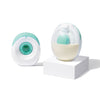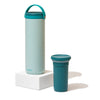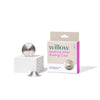One of the things you may miss as a new mama is catching those Z’s, but it’s necessary in the early days of your baby’s life to support their growth and development. Trust us when we say, becoming a nocturnal creature (albeit a temporary one) is shocking, overwhelming and sometimes straight up brutal. We’ve been there. But it’s not all bad and you can learn some tips and tricks to help you through the night.
Keep reading for Willow's 9 tips for getting through the night while you’re breastfeeding.
Why Breastfeeding at Night Is Important
On average newborns feed about every 2 to 4 hours for exclusively breastfed babies—which means they eat around the clock making night time feeds not only critical but impossible to avoid. Babies eat more often due to the size of their tummies—remember, they’re stomachs are tiny so they fill up fast which means they get hungry fast, too! Not only that, but breast milk is the perfect food and thus is digested extremely efficiently.
Breastfeeding & Circadian Rhythm
Breastfeeding at night also helps your baby sleep and contributes to healthy circadian rhythms. Breast milk contains amino acids that the body uses to create sleep-inducing melatonin. And those amino acids are released in line with your circadian rhythms.
As a result, nighttime breastfeeding helps your baby’s body learn when it’s time to sleep. It’s the science behind that first time your baby sleeps through the night.
Newborn Night Feeding & SIDS
Studies have also shown that exclusively breastfeeding for at least two months cuts your baby’s risk of sudden infant death syndrome (SIDS) in half. Breastfeeding also increases your awareness at night which can help protect your baby.
9 Tips for Nighttime Breastfeeding
Ready to learn how to make the most of those nighttime feedings? We’ve got you covered, mama.
1. Get Comfortable
First, find a breastfeeding position that’s comfortable for you and your baby. For example, you can sit up and cradle your baby or try the side-lying position if you choose to remain in bed. Grab your favorite blanket and pillow for added comfort.
2. Don’t Watch the Clock
Some of the struggles of breastfeeding at night are mental. You may find yourself watching every minute tick by on the clock. You may start counting how many more hours are left until the sun comes back up. And you may start to feel anxious which will negatively affect the sleep you do get.
Don’t do it, mama. Instead, focus on your baby. Remind yourself of the reasons you’re doing what you’re doing and take that clock off the wall or nightstand. You’ve got this!
3. Keep the Lights Off & Avoid Blue Lights
Keeping the lights off can help you and your baby stay in the mindset of sleep. So, when you awake to feed, it’s easier to fall back asleep again. For light, try a nightlight in the baby's room or your bedroom, depending on where your baby is sleeping.
It’s also important to avoid using your phone or watching TV at night. The blue lights emitting from these devices can suppress melatonin, making it more difficult for you to fall back asleep.
4. Prepare a Breastfeeding Survival Kit
It’s best to have everything close by so you can grab and feed or pump easily. Prepare a basket or bag that includes everything you need, including diapers, wipes, your pumping supplies (if needed), a bottle of water and a snack.
5. Create a Personal Bedtime Routine
Following a routine can help prepare your body for sleep. Plus, it can help you prepare mentally for the hours ahead. Spend some time taking care of yourself by doing a quick skincare routine or journaling. Find something comfortable to put on and listen to a sleep podcast. Whatever you do, make it personal to you.
6. Try Techniques for Falling Asleep Faster
You’ll want to take advantage of every second you can rest between feedings. There are plenty of techniques out there to help you fall asleep faster:
- Meditate: Meditation can help you relax after a stressful day as a new mom. Try some deep breathing exercises or simply sit with your eyes closed.
- Eat a snack: Certain foods like nuts and cereal contain substances that can bring on sleep. Try grabbing a quick snack before you turn down the sheets.
- Cool your room: A cool bedroom can help improve your sleep. The experts at Cleveland Clinic say a bedroom between 60 and 67 degrees Fahrenheit is just right.
7. Keep Focused While Feeding to Ensure You Don’t Fall Asleep
It’s impossible not to feel tired, especially in those first few weeks with a newborn. To ensure your baby is safe and that each feeding is effective, do something to stay focused so you don’t fall asleep.
This may mean getting out of bed and finding a new place to feed your little one, setting a timer, scrolling through Instagram, or texting a new mama friend. Those 3am text conversations have been known to be illuminating!
8. Get Support
It’s important to remember that you’re not alone and you can and absolutely should ask for help if you need a break and some extra sleep. That’s also what pumping (and Willow!) is for. Take some time to pump a bottle and have your partner, mom, friend, family member or mother-in-law help you with a late-night feed. It’s ok to ask for help—you can’t do it all and you shouldn’t!
How to Breastfeed a Sleepy Baby
It’s the middle of the night. You’re sleepy, your baby’s crying because they’re hungry and just as you get them to latch, they start to doze off again. This is a common occurrence in the beginning stages of feeding and one you can fix with a few mom hacks. One important thing to know: once your baby has established a good weight gain pattern, you can stop waking baby to nurse and let them set their own pattern. The rule of thumb is: Gaining at least 4 ounces per week, for babies under 4 months once they’re at a healthy weight, you can let them sleep (and catch your own Zzzz’s as well).
Tips for keeping baby awake during night feeds
- Feed frequently: Sleepy babies will sometimes latch and suck for a little while only to fall asleep again. Frequent feeding will ensure your baby receives enough milk. Don’t worry, mama, this sleep phase won’t last forever.
- Stimulate your baby: Tickle their feet (they don’t like it!), talk or sing to your baby or rub their cheek gently to keep them stimulated and awake.
- Breast massage and compression: This will keep milk slowly flowing and help your baby stay awake.
- Try skin-to-skin contact: Skin-to-skin contact helps inspire your baby’s natural feeding instincts. This can rouse them awake and encourage them to eat.
This article was written in partnership with our International Board Certified Lactation Consultant, Wendy Wright, who loves working side by side with moms and babies to find that secret sauce! She’s also a mother of two and the Mom Experience Lead at Willow Pump.
Get pumping support with Simplifed
Get pumping support with Simplifed
Get access to free virtual feeding support from the lactation consultants at Simplifed. They can help you navigate supply issues, introduce a bottle, and more, and are trained on Willow pumps.


















